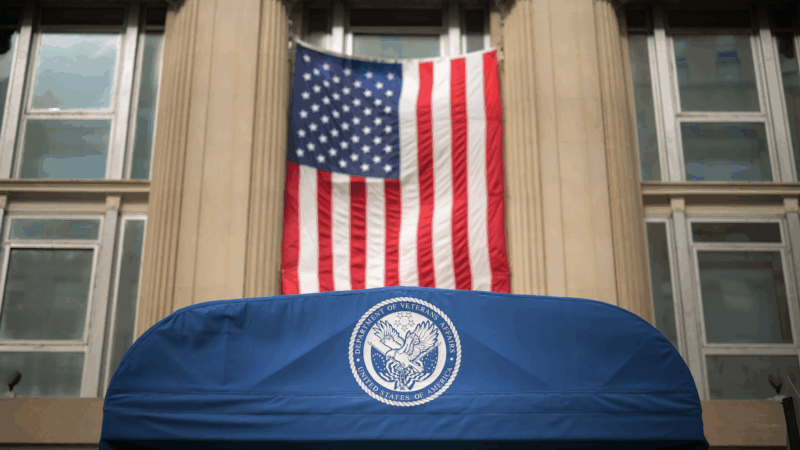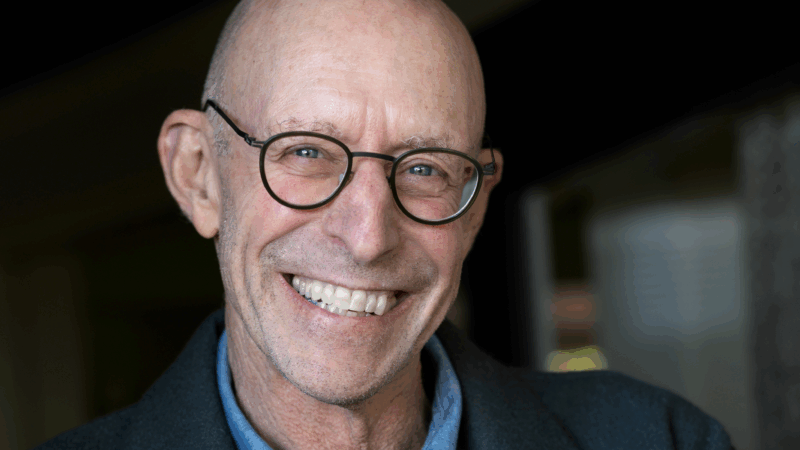VA research brought CT scans and pacemakers into the world. Now it’s at risk of cuts
For Stephan Fihn, the reward was seeing how Veterans Affairs research changed his patients’ lives.
“A big one was the management of prostate enlargement. You know, when I went into practice, the standard treatment for men with prostate symptoms was surgery,” he told NPR.
Then VA research revealed that medication was just as effective as surgery.
“So instead of sending a patient to a urologist for a surgeon, I could prescribe a pill,” said Fihn, who worked at the VA for 36 years as both a physician and a medical researcher.
Dr. Fihn lists similar examples: the nicotine patch, the first liver transplant, CT scans, and pretty much all the little rapid test strips used to detect everything from pregnancy to COVID, are the result of VA-funded research. Congress authorized nearly $1 billion in VA research last year, but Fihn and several colleagues warn that it’s all under threat.
“Sudden, arbitrary personnel decisions are placing thousands of researchers and tens of millions of dollars of ongoing research at risk and threatening the future of a $2 billion research enterprise that extends back more than 80 years,” Fihn wrote in a recent piece he co-authored in JAMA Internal Medicine.
Uncertainty and staff departures
The concerns began when VA froze all hiring and posted a list of hundreds of VA contracts to be cut. After an outcry — that VA is perpetually short-staffed in many key medical fields — VA promised none of those cuts will come from the VA’s more than 300,000 frontline health jobs, exempting them from the freeze. Medical research was not initially spared. Then on March 7, VA extended for 90 days the terms of all research employees whose appointments were otherwise due to expire.
“We aim to make it even more effective. That’s why VA is conducting a comprehensive assessment of ongoing research initiatives to evaluate their impact on Veteran health care,” said VA spokesman Pete Kasperowicz. He said the 90 day pause will ensure continuity of all research efforts as VA completes its review.
But the uncertainty means research projects have already lost critical staff, like data analysts, to the VA’s deferred resignation offers, according to several department researchers who requested anonymity because they fear retaliation. They said long-term projects could get interrupted, like the VA’s million veteran program, one of the world’s largest genetic study groups.
Just as important as the things VA research discovers, says former VA Chief of R&D, Timothy O’Leary, is what it debunks. He points out that in the private sector there isn’t much interest in funding studies that might show a new drug isn’t better than the old one.
“The VA conducts enormous numbers of clinical trials, a lot of which wouldn’t happen otherwise because there isn’t much incentive for a pharmaceutical company to be comparing their new drug with old treatments. I mean, what’s the upside potential for them?” he says.
As the largest healthcare network in the country, with a patient-base that has already shown a sense of commitment to service, VA can conduct these trials much more easily than almost any other medical system in the country — unclouded by a profit motive.
“VA clinical trials have shown this many times that new intervention really isn’t any better. Pharmaceutical companies, medical device companies may not want to take the risk of that kind of outcome, but VA can take the risk because it’s not in the business of selling drugs or selling medical devices, whether they be cardiac stents or anything else. It’s in the business of doing the best possible job for veterans and the best possible job for taxpayers,” O’Leary says.
A ticking clock
Researchers worry that the public doesn’t know how much U.S. medical innovation involves VA projects. Rashi Romanoff, chief executive officer of the National Association of Veterans’ Research and Education Foundations said the 90 day pause, which ends in June, is a chance to get the word out.
“Investing in VA’s biomedical and innovation arm is good also for America on the global stage. I think the pause has given us all a chance to be able to talk about that. This is the moment really that we should be doubling down in research investments,” she said.
Math might get in the way though. The Trump administration is standing by a pledge to cut 70,000 to 80,000 jobs at VA, with the more than 300,000 frontline health workers exempted from those cuts. That implies devastating cuts to all other positions, including VA medical research jobs.
Transcript:
MARY LOUISE KELLY, HOST:
The Trump administration says it will cut more than 70,000 jobs – 70,000 – also hundreds of contracts from the Department of Veterans Affairs. And this comes after Congress authorized close to a billion dollars in research funding for the agency. The pacemaker, how we do liver transplants, CT scans, all of these innovations came from the VA. And as NPR’s Quil Lawrence reports, scientists fear that lifesaving research will be scrapped.
QUIL LAWRENCE, BYLINE: Stephan Fihn started working at the VA in 1982.
STEPHAN FIHN: I was a primary care physician at the VA for 36 years, up until the time I retired.
LAWRENCE: He saw patients but also held various leadership posts, including acting chief of research and development. And in four decades, he got to see that research work.
FIHN: Yeah. I mean, a big one was the management of prostate enlargement. You know, when I went into practice, the standard treatment for men with prostate symptoms was surgery.
LAWRENCE: But then VA research revealed that medication – alpha blockers – was just as effective as surgery.
FIHN: And so instead of sending a patient to a urologist for a surgeon, I could prescribe a pill.
LAWRENCE: Dr. Fihn can go on. He watched veterans and civilians alike start to get nicotine patches to quit smoking, new PTSD treatments, both through medications and other therapy. And just as importantly, VA research uncovered things that don’t work. Former chief of VA R&D Timothy O’Leary says the private sector has no interest in funding studies that might show that their new drug is not better than the old one.
TIMOTHY O’LEARY: Sometimes, and VA clinical trials have shown this many times, that new intervention really isn’t any better. Well, pharmaceutical companies, medical device companies, may not want to take the risk of that kind of outcome. But VA can take the risk because it’s not in the business of selling drugs. It’s in the business of doing the best possible job for veterans and the best possible job for taxpayers.
LAWRENCE: VA spokesman Pete Kasperowicz said VA is not planning to scale back its research mission, but is conducting a comprehensive review. And after initially calling a hiring freeze, VA paused that for research jobs, at least until June. Researchers say they worry that the public doesn’t know how much U.S. medical innovation involves VA projects. Rashi Romanoff is with the National Association for Veterans’ Research. She’s hoping the word will get out before the pause ends in about a month.
RASHI ROMANOFF: Investing in VA’s biomedical and innovation arm is good also for America on the global stage. I think the pause has given us all a chance to be able to talk about that, that we should be doubling down in research investments.
LAWRENCE: But several researchers, who NPR granted anonymity because they fear retaliation, said the uncertainty means they’re already losing critical support staff, like data analysts to the VA’s deferred resignation offers. And they’re concerned that research projects that examine women’s health or race-related health issues are likely to be cut and that long-term projects could get interrupted, like the VA’s Million Veteran Program, one of the world’s largest genetic study groups. But the VA has promised massive job cuts, then pledged that none of those cuts will come from the VA’s hundreds of thousands of frontline health jobs. VA has made no such pledge for medical research jobs.
Quil Lawrence, NPR News.
R&B stars consider two ways to serve an audience
Two albums released the same day — Jill Scott's return from a long absence, and Brent Faiyaz's play for a mid-career pivot — offer opposing visions of artistic advancement in the genre.
Baby chicks link certain sounds with shapes, just like humans do
A surprising new study shows that baby chickens react the same way that humans do when tested for something called the "bouba-kiki effect," which has been linked to the emergence of language.
American Jordan Stolz speedskates to a third Olympic medal — silver this time
U.S. speedskater Jordan Stolz had a lot of hype accompanying him in these Winter Olympic Games. He's now got two gold medals, one silver, with one event to go.
Bad Bunny and J. Cole rule the pop charts
These days, the Super Bowl halftime show is a massive driver of the streaming, airplay and sales that fuel the Billboard charts. This week, Bad Bunny benefits from that influence.
Reporter’s notebook: My Olympic Lunar New Year
An NPR reporter covering the Olympics in Milan takes us on cultural side quests, to a hospitality house and a candy store.
Michael Pollan says AI may ‘think’ — but it will never be conscious
"Consciousness is under siege," says author Michael Pollan. His new book, A World Appears, explores consciousness on both a personal and technological level.








